Since cats became domesticated, they have developed ways to communicate with the humans in their life.
When you’ve lived with your cat long enough, you can begin to understand what certain meows and body language mean.
Still, some messages don’t always translate, like why your cat wants to walk you to their food.
Cats want you to walk them to their food for a few reasons. They need a sense of safety, it is a learned behavior, or they feel something with their food is amiss.
Determining if this need is a behavioral or food issue can help break your cat from this routine.
If Your Cat Won’t Eat Without You, Here Are Some Possible Reasons
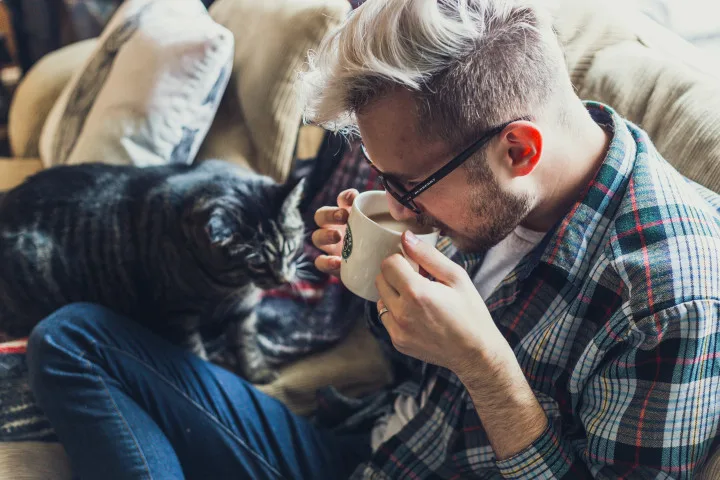 Mealtime is one the most relaxed times for cats and also when they feel the most vulnerable. If your cat wants you there while they eat, they’re looking to you to feel safe and protected.
Mealtime is one the most relaxed times for cats and also when they feel the most vulnerable. If your cat wants you there while they eat, they’re looking to you to feel safe and protected.
It’s likely they are enlisting you as their personal bodyguard while they enjoy their mealtime.
Make sure they eat in a spot that makes them feel safe. Cats tend not to eat near their litter boxes. If their food bowl is isolated, try to move it into the kitchen or near where you are present frequently.
This will help them eat with peace of mind and still feel close to you.
Your Cat Is In A New Environment
Have you and your cat moved to a new home? Or have you recently adopted a cat that needs you to walk them to their food?
Changes in the environment could be a factor in your cat’s need to feel safe while eating.
Sometimes if a cat feels scared or unsure of their new environment, it will look to you for assurance. Your cat may need you more than usual, especially when they feel at their most vulnerable.
Sitting quietly with your cat while they explore its new environment can help them adjust. Be sure to surround them with items with a familiar scent to help put them at ease.
Then begin to introduce them to more of their new surroundings gradually.
Your Cat Has Learned This Behavior
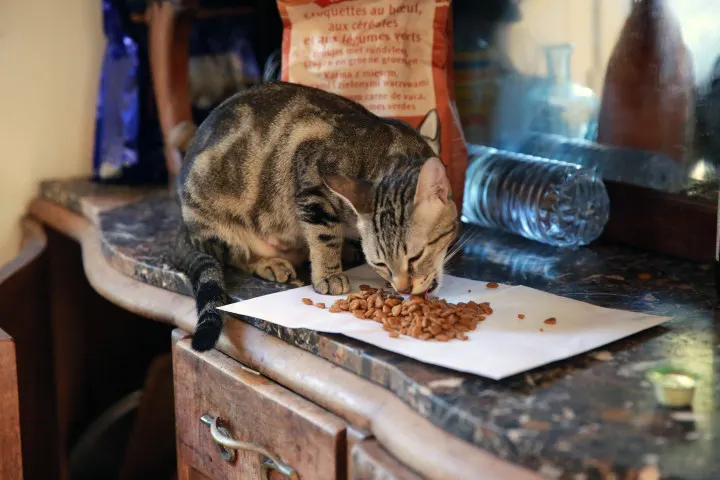 Cats are creatures of habit. If you’re wondering how this behavior got started, think back to when they were kittens. Were you there to make sure they ate? Or did you have to spoon-feed them, perhaps?
Cats are creatures of habit. If you’re wondering how this behavior got started, think back to when they were kittens. Were you there to make sure they ate? Or did you have to spoon-feed them, perhaps?
There’s a chance that this was a learned behavior and, over time, has become a habit for them. The downside to your cat only eating with you around is they may not eat at all if you’re gone.
Taking a vacation or business trip could mean your cat may refuse to eat in your absence.
This behavior could cause serious health problems for your cat. When a cat goes without food, its liver will start breaking down stored fat for fuel. A cat’s liver can’t handle large amounts of fat.
If you are concerned your cat isn’t eating enough, contact your veterinarian.
Your Cat Is Trying To Tell You Something
If this behavior is new for your cat, there’s the possibility they are unhappy with their meal.
Your cat may be trying to tell you that there is something wrong with their food. Cats are notoriously picky eaters but investigate to see what message your cat is trying to send you.
What a cat wants and how they try to tell you isn’t always clear. However, there are things you can look for that may help you pinpoint the issue.
Food Concerns
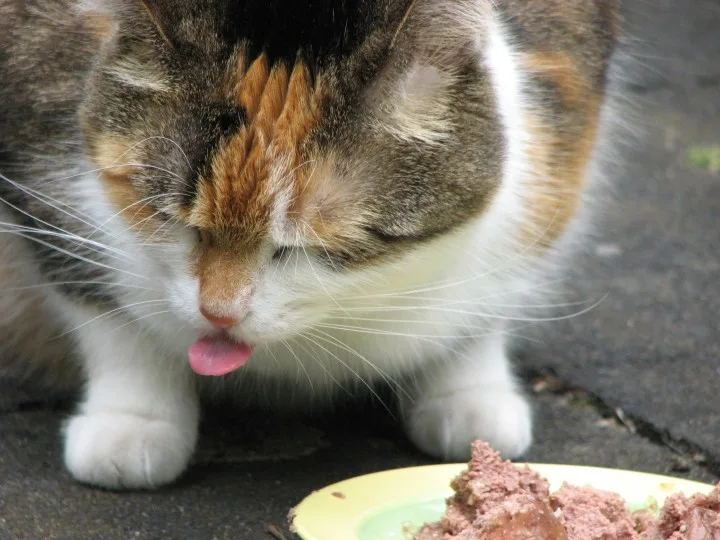 Your cat could be trying to tell you the concerns they have with their food. Usually, this isn’t something to worry about. Most likely, they want you to know they do not feel their food is fresh.
Your cat could be trying to tell you the concerns they have with their food. Usually, this isn’t something to worry about. Most likely, they want you to know they do not feel their food is fresh.
An easy solution for this is to stir their food, which should encourage them to eat. Your cat could also be trying to get you to feed them another portion. Or maybe add some canned food to it.
Needless to say, always be sure to give your cat the appropriate portions of food. Cats have a knack for making us believe they are starving and need more food.
If you’re confident you’ve given your cat the correct portion, then try not to give in to their demands.
What If Your Cat Won’t Eat?
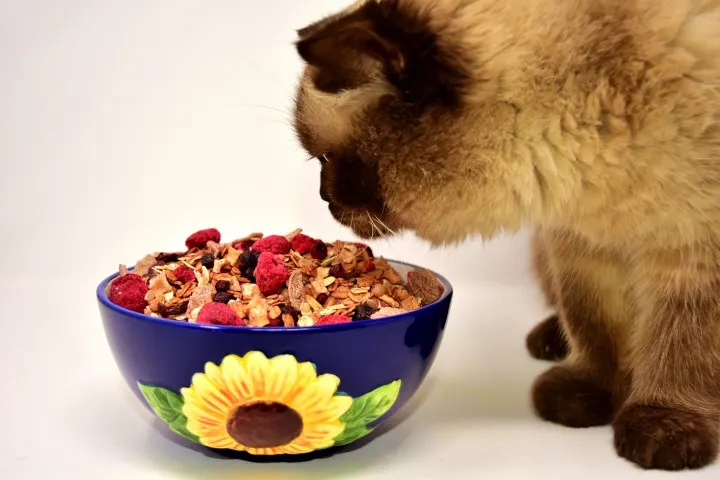 Cats are known to be picky eaters. Often, stirring their food will encourage them to eat. However, call your veterinarian if your cat hasn’t eaten anything you’ve offered them after 24 hours.
Cats are known to be picky eaters. Often, stirring their food will encourage them to eat. However, call your veterinarian if your cat hasn’t eaten anything you’ve offered them after 24 hours.
Loss of appetite is a strong indicator that your cat is not feeling well. Any number of medical conditions can cause this, such as infections, kidney failure, intestinal problems, and cancer.
These serious conditions are why it is essential to contact your vet immediately to properly diagnose your cat’s symptoms.
Some less worrisome reasons for your cat losing their appetite could be traveling, unfamiliar surroundings, and a recent vaccination.
These factors can cause a temporary loss of appetite. However, always consult with your vet about any concerns with any changes in your cat’s eating patterns.
Why Is My Cat A Picky Eater?
Like us, cats have preferred food preferences. Some cats like just wet food, while others prefer dry or a mix of both.
Once you’ve narrowed down your cat’s favorite flavors and textures, keep it consistent to guarantee your cat will eat.
Resist the urge to feed your cat human food as a means to get them to eat. Doing this too frequently can make it challenging to transition back to cat food.
This difficulty can pose some problems since cat food’s design caters to a cat’s specific dietary needs.
Finding The Right Cat Food
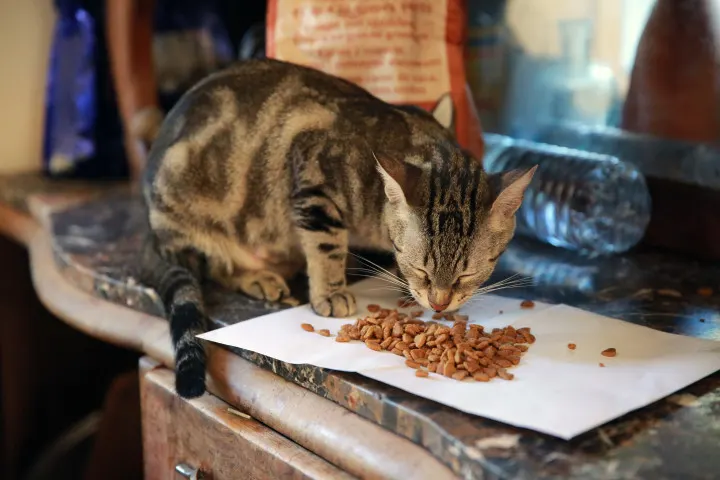 Make sure you’re providing your cat with well-balanced and nutritious food. A cat’s essential needs are protein, taurine (an essential amino acid), water, certain fatty acids, vitamins, and minerals.
Make sure you’re providing your cat with well-balanced and nutritious food. A cat’s essential needs are protein, taurine (an essential amino acid), water, certain fatty acids, vitamins, and minerals.
Cats don’t need carbohydrates, so try to avoid foods with more fillers than nutrients, like most of the cheaper foods.
Then there is the age-old question, wet or dry? While a cat’s preferences can vary, the popular recommendation is to give both to add variety.
This combination can help keep your cat from getting bored with its food.
If your cat has a specific diet for medical reasons, contact your vet before making any changes to their food.
Using Food And Touch To Gain Your Cat’s Trust
Petting a cat while they eat can help you bond and build trust with them. People often refer to this as “affection eating.”
This is especially useful if you recently adopted your feline friend and are looking for ways to bond.
If they are skittish and unsure, petting them while they’re eating can help with befriending them and building trust.
This technique is beneficial in helping a cat that gets overstimulated and bites and scratches when being petted.
Slowly adding more time to petting a cat while it is eating can help desensitize them to being touched.
Some cats may not want to be touched while they eat. Just having you near is all they need. Try even speaking to them with a soothing voice.
Once they begin to feel comfortable, they might not require your presence anymore. However, cats easily create habits. So be careful not to create a routine that is hard to break.
Breaking The Habit Of Walking Your Cat To Their Food
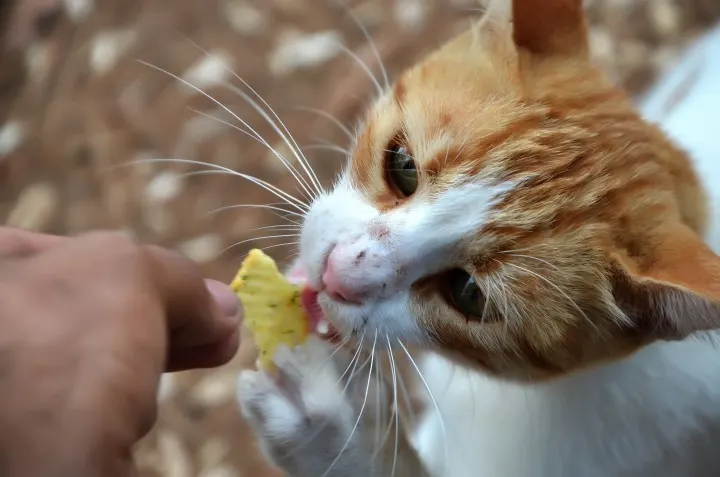 Are you concerned about your cat not eating without you but not sure what to do? Don’t worry; there are steps you can take to help change this behavior.
Are you concerned about your cat not eating without you but not sure what to do? Don’t worry; there are steps you can take to help change this behavior.
It will take a little work, but eventually, your cat will be able to eat without you to keep watch.
Start by continuing to join your cat while they eat as usual. Then walk away right before your feline friend finishes eating. If they stop to fetch you, then rejoin them.
Try slowly pulling away and extending your time away. Start with 5 minutes, then 10 minutes, and so on. Your cat may not like this and will ignore their food in protest. But most cats will eventually eat if they’re hungry.
Unless your cat has a medical condition requiring a consistent eating schedule, a temporarily irregular eating routine shouldn’t hurt them.
Finally, try more bonding outside of mealtime. Opportunities could include brushing, petting, and cuddling in your lap while watching tv. Or you could seek your cat out to shower them with affection.
Contact your vet if you don’t see a change and your cat still refuses to eat without you.
Related Questions
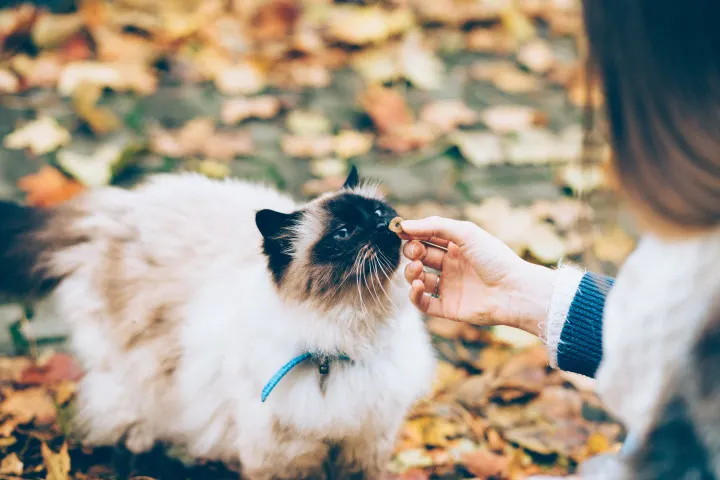 Why does my cat follow me to the bathroom?
Why does my cat follow me to the bathroom?
Cats have figured out that your bathroom time is an opportunity for undivided attention. Most of the time, our focus is on other activities.
So they’re going to take advantage of this opportunity for uninterrupted attention.
Why does my cat want me to watch them poop?
They feel vulnerable and need you to be their ‘lookout.’ Your cat is looking to you for cues on whether or not it is safe. While this can be quite awkward, it is harmless behavior.
Stacy is a lifelong animal lover who truly believes life just isn’t complete without pets. She’s had pets her whole life (including three dogs and a cat living under the same roof, somewhat harmoniously). She currently resides in NOLA with her husband, son, and two pups, Scooby “Dooby” Doo and Zoey. Stacy always makes a point to learn everything she can about her fur babies, and she has been writing about the pet-parent life for over two years.

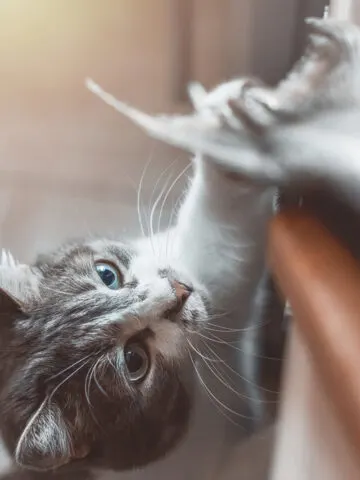

Leave a comment
You must be logged in to post a comment.